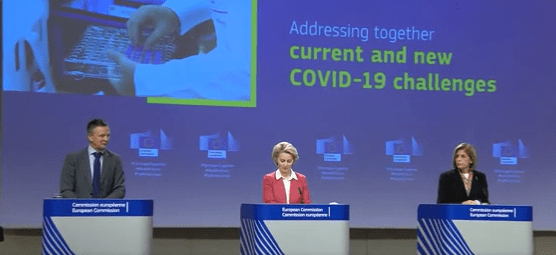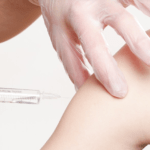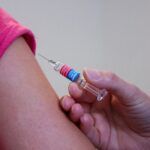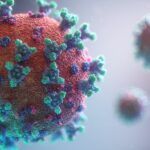The Commission is today putting forward a common and coordinated EU approach to address effectively the challenges from the resurgence of COVID-19 in many Member States this autumn.
There are rapidly rising case numbers and a renewed pressure on hospitals, which calls for urgent and determined action. The new potential threat from the Omicron variant is adding to these concerns, and underlines the importance of tackling the pandemic to progress towards long-term health security, both in the EU and globally.
Ursula von der Leyen, President of the European Commission, raised the need to put the debate on compulsory vaccination on the table, in view of the new figures of unvaccinated population today (min. 23:00 of the video) and declared: “One third of the European population is not vaccinated: that’s 150 million people. That’s a lot. And not everybody can be vaccinated, there are very young children for example, or people with special medical conditions but the vast majority can. And so I think it is understandable and appropriate to lead this debate now. How can we encourage and think about the possibility of compulsory vaccination within the EU? This needs to be debated, it needs a common approach but it is a debate that needs to happen”.
We are now facing a double challenge in the fight against #COVID19.
The rapid resurgence of Delta across Europe and a new variant of concern: Omicron.
Full vaccination and boosters provide the strongest protection there is. And they are available now. https://t.co/FOuda4Jbvj
— Ursula von der Leyen (@vonderleyen) December 1, 2021
Ursula von der Leyen, also said: “Over the last couple of weeks, many of us have witnessed it first hand: COVID 19 has resurged infecting some of our close friends, co-workers, family members or loved ones. The rapidly increasing case numbers are putting an increasingly heavy strain on our hospitals and health workers. On top the arrival of the presumably highly contiguous omicron variant calls for our utmost attention. But I am convinced that the EU is up to the task to tackle these challenges. Today we are presenting a broad array of actions, from stepping up our vaccination efforts and investment in treatments, to improving monitoring and prevention, and reinforcing our global solidarity. In the meantime I reiterate my urgent call to all of you: get vaccinated, get a booster, and follow the rules to protect yourselves.”
Stella Kyriakides, Commissioner for Health and Food Safety, added: “The high transmissibility of the Delta variant, a significantly high immunity gap and the easing of non-pharmaceutical interventions will bring us a challenging winter. The emergence of the Omicron variant only adds to the urgent need to vaccinate and to boost our immunity in order to break transmission chains. Where needed, effective public health measures, including social distancing and masks need to be introduced. We must act quickly and decisively to limit the spread of the virus and mitigate its impact.”
The surge in cases of severe illness, especially among the unvaccinated, has resulted in an enormous pressure on hospitals and on already stretched healthcare staff. This also has a direct impact on the health of non-COVID patients as once again access to healthcare for other conditions is put under heavy strain by the need to treat COVID-19 patients.
Coordinated action to combat COVID-19
The EU and Member States must demonstrate the capacity to react swiftly in order to address the upsurge in the virus and to maintain the drive for a strong and sustainable long-term response to this threat. This calls for determined and urgent responses, including:
- The EU and Member States should continue to implement a joint strategy to limit the entry of the Omicron variant into the EU, with regular, daily reviews of essential travel restrictions. The EU and Member States should stand ready to impose all necessary controls;
- Member States should run renewed campaigns to target unvaccinated people in all eligible age groups, with targeted national strategies to address vaccine hesitancy;
- Member States should rapidly deploy booster doses to maintain strong levels of protection against the virus including the Omicron variant, starting with the most vulnerable groups;
- EU agencies should ensure that the necessary scientific guidance is rapidly available;
- The Commission will step up efforts to produce, authorize and jointly procure COVID-19 therapeutics;
- The European Parliament and the Council should adopt the European Health Union proposals and the HERA crisis regulation by the end of 2021;
- Member States should put in place targeted and proportionate precautions and restrictions to limit the spread of the virus, saving lives and reducing the pressure on healthcare systems. Full EU coordination should be assured. The onset of the Omicron variant means that particular attention should be paid to applying and communicating specific measures on contacts during the end-of-year period;
- Member States should implement the revised approach for free movement with a standard 9-month validity period under the EU Digital COVID certificate;
- The EU and Member States should accelerate Team Europe efforts on vaccine sharing to achieve the global vaccination target of 70% in 2022 agreed at the G20 summit in October 2021, and support capacity building for sequencing, testing and vaccination. There should also be a clear EU position on the way forward in ensuring a stronger, more equitable and accelerated global health architecture.
The President has asked Professor Peter Piot to be the Commission’s Chief Scientific Advisor for Epidemics, within his existing mandate.
Background
The EU Vaccines Strategy remains the EU’s primary tool for ending the pandemic by preventing and reducing transmission of cases, as well as hospitalisation rates and deaths caused by the disease. It is complemented by the EU strategy on COVID-19 therapeutics. They form part of a strong European Health Union, using a coordinated EU approach to better protect the health of our citizens, equip the EU and its Member States to better prevent and address future pandemics, and improve resilience of Europe’s health systems.







Leave a Reply